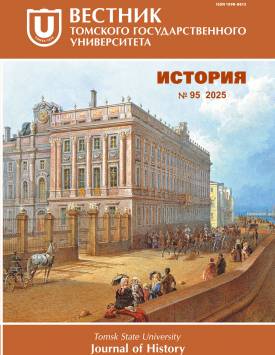Features of social protection of disabled people, participants of the Great Patriotic War, in the context of ensuring state security of the USSR in the post-war period (1945–1953)
The expediency of carrying out social policy measures in relation to disabled people who returned from the war in the first post-war years was due to the huge number of people with disabilities (about 3.8 million people), which created an internal threat to the state security of the USSR. At the end of the Great Patriotic War, the Soviet state faced one of the priority tasks, which was to provide social protection for the above-mentioned category of the population. The purpose of the article is to identify the features of social protection of disabled people who returned from Great Patriotic War, through the prism of ensuring the state security of the USSR. To achieve this goal, the authors of the article used a system of scientific methods based on the principle of consistency, an institutional approach and analysis of archival sources, which made it possible to identify the social problems of disabled people among combatants who directly affected the security of the Soviet Union, and also consider the implementation of a number of areas of social protection in relation to them. The theoretical and methodological foundations of the study are the ideas of I.V. Antonovich, N.F. Basova, G.N. Gor-dienko, V.Yu. Zolotareva, G.F. Krivosheeva and D.G. Khayarov, engaged in the study of the problems of social protection of the disabled in the post-war period. In the process of the study, the authors come to the following conclusions: 1. One of the priority areas of social protection of disabled people in the post-war period (1945-1953) was pension provision. The levels of state disability pensions were highly differentiated and low. Mutual aid funds of collective farms played an important role. 2. The activities of medical and labor expert commissions caused a lot of complaints from the disabled who suffered as a result of Great Patriotic War. Nevertheless, when a significant percentage of demobilized citizens began to find jobs in large numbers at enterprises, cases of dismissal of disabled people were recorded in a number of regions of Soviet Union, and there were also cases of discrimination against this category of the population. 3. The management of large Soviet enterprises, supported by party workers, provided special workstations to facilitate the work of disabled people. 4. The Soviet post-war system of vocational training as a whole effectively solved the problems of training professional personnel. However, when a large proportion of the demobilized citizens began to seek employment in factories on a massive scale, there were cases in several regions of the Soviet Union where disabled persons who had been forced to work during the Great Patriotic War were dismissed. There have also been cases of discrimination against this population group. 5. With the end of Great Patriotic War, the problem of food provision was not completely resolved, as there were still disruptions in local supplies. The authors declare no conflicts of interests.
Keywords
Great Patriotic War, disabled person, social protection, state security, pension provisionAuthors
| Name | Organization | |
| Fantrov Pavel P. | Volgograd State University | pavelfantrov@volsu.ru |
| Danyukova Alla V. | Volgograd State University | yub-183_526152@volsu.ru |
References

Features of social protection of disabled people, participants of the Great Patriotic War, in the context of ensuring state security of the USSR in the post-war period (1945–1953) | Tomsk State University Journal of History. 2025. № 95. DOI: 10.17223/19988613/95/10
